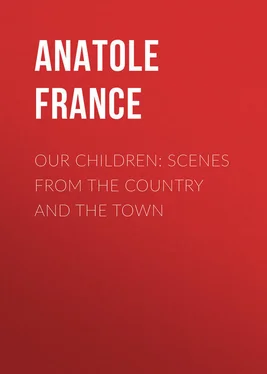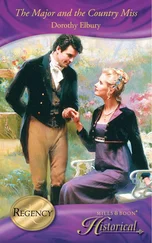Anatole France - Our Children - Scenes from the Country and the Town
Здесь есть возможность читать онлайн «Anatole France - Our Children - Scenes from the Country and the Town» — ознакомительный отрывок электронной книги совершенно бесплатно, а после прочтения отрывка купить полную версию. В некоторых случаях можно слушать аудио, скачать через торрент в формате fb2 и присутствует краткое содержание. Жанр: foreign_antique, foreign_prose, foreign_children, Детская проза, на английском языке. Описание произведения, (предисловие) а так же отзывы посетителей доступны на портале библиотеки ЛибКат.
- Название:Our Children: Scenes from the Country and the Town
- Автор:
- Жанр:
- Год:неизвестен
- ISBN:нет данных
- Рейтинг книги:3 / 5. Голосов: 1
-
Избранное:Добавить в избранное
- Отзывы:
-
Ваша оценка:
- 60
- 1
- 2
- 3
- 4
- 5
Our Children: Scenes from the Country and the Town: краткое содержание, описание и аннотация
Предлагаем к чтению аннотацию, описание, краткое содержание или предисловие (зависит от того, что написал сам автор книги «Our Children: Scenes from the Country and the Town»). Если вы не нашли необходимую информацию о книге — напишите в комментариях, мы постараемся отыскать её.
Our Children: Scenes from the Country and the Town — читать онлайн ознакомительный отрывок
Ниже представлен текст книги, разбитый по страницам. Система сохранения места последней прочитанной страницы, позволяет с удобством читать онлайн бесплатно книгу «Our Children: Scenes from the Country and the Town», без необходимости каждый раз заново искать на чём Вы остановились. Поставьте закладку, и сможете в любой момент перейти на страницу, на которой закончили чтение.
Интервал:
Закладка:
Anatole France
Our Children: Scenes from the Country and the Town
FANNY
Fanny started off early one morning, like little Red Riding Hood, to visit her grandmother, who lives quite at the other end of the village. But Fanny did not stop like Red Riding Hood to pick hazel nuts. She went straight on her way, and did not see any wolf.
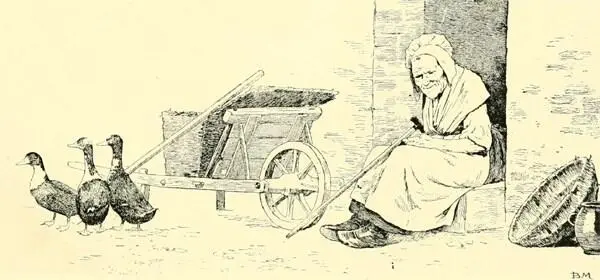
Even when quite a long way off, she could see her grandmother seated on her stone doorstep, the dear grandmother who smiled with her toothless mouth and opened her old arms thin as grape vines to welcome her little granddaughter. Fanny’s heart was filled with delight at the prospect of spending a whole day at her grandmother’s. And her grandmother, having no longer any cares or tasks, but living like a cricket near the fire, is happy too to see the little daughter of her son, a sweet reminder of her youth.
They have many things to say to each other, for one of them is at the end of life’s voyage and the other is just setting out upon it.
“You grow bigger every day, Fanny,” says her grandmother, “and I am getting littler. Just look! I need hardly stoop to press my lips to your forehead. What difference does it make how old I am when I still have youth’s roses in your cheeks, Little Fanny.”
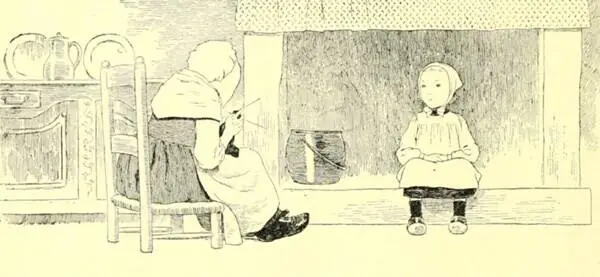
But Fanny is exploring for the hundredth time, with new joy, all the curious things in the little house – the paper flowers blooming beneath the glass globe, the old paintings of French generals in fine uniforms overthrowing their enemies, the gold cups, some with handles and some without, and grandfather’s old gun which hangs on the chimney breast on a nail from which grandfather himself fastened it – for the last time, thirty years ago.
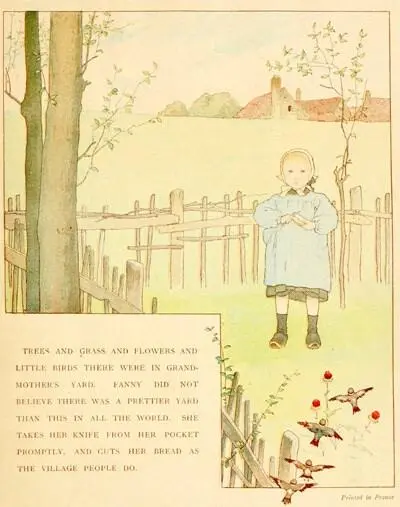
TREES AND GRASS AND FLOWERS AND LITTLE BIRDS THERE WERE IN GRANDMOTHER’S YARD. FANNY DID NOT BELIEVE THERE WAS A PRETTIER YARD THAN THIS IN ALL THE WORLD. SHE TAKES HER KNIFE FROM HER POCKET PROMPTLY, AND CUTS HER BREAD AS THE VILLAGE PEOPLE DO.
Printed in FranceBut the hours pass and the first thing one knows it’s time to get ready for the noonday dinner. Grandmother stirs up the wood fire that has been slumbering quietly, and then she breaks some eggs in the black tiled hearth, while Fanny watches with great interest the omelette and bacon that turns gold and sings in the flame. Grandmother knows better than any one how to make ham omelettes and tell stories. Fanny, seated on the little stove, her cheek no higher than the table, eats the steaming omelette and drinks sparkling cider. Grandmother, however, as her habit is, eats standing near the corner of the hearth. She holds her knife in her right hand, and in the other her snack spread on a crust of bread. When they have finished, both of them, Fanny says:
“Grandmother, tell me the story of the blue bird.”
And grandmother tells her story of the blue bird, how a wicked fairy changed a beautiful young prince into a bird the color of the deep sky, and of the great sorrow the princess felt when she saw the change and beheld her lover flying all ruddy and dripping toward the window of the tower in which she was shut up.
Fanny is very thoughtful when she hears this story.
“Was it a long, long time ago, Grandmother, that the blue bird flew toward the tower where the princess was shut up?”
Grandmother replies that it was all a good while ago, those things, in the days when animals could talk.
“Were you young then?” asks Fanny. “I wasn’t born yet,” says Grandmother. And Fanny says to her: “I suppose a great many things happened before you were born, didn’t they, Grandmother?”
When they are through with their little talk Grandmother gives Fanny an apple and some bread.
“Now run away, pet, and eat this in the yard.”
And Fanny goes out into the yard, where there are trees and grass and flowers and little birds.
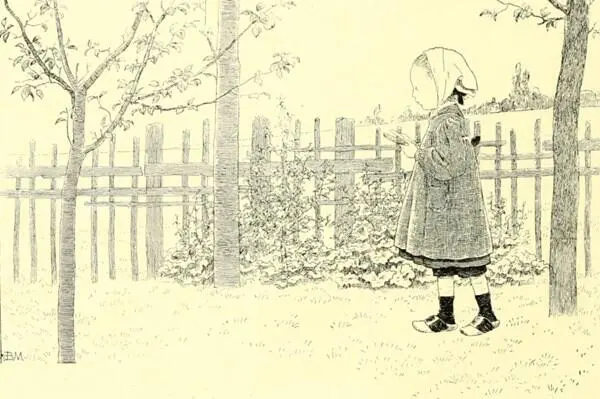
Trees and grass and flowers and little birds there were in grandmother’s yard. Fanny did not believe there was a prettier yard than this in all the world. Already she takes her knife from her pocket to cut her bread as the village people do. She crunches into the apple first thing of all and then begins to munch her bread. Just then a little bird comes fluttering near her, then another, and then a third, then ten, twenty, thirty of them, all circling about her, some of them gray, some red, some brown and green and blue, all of them so pretty, and all singing. Fanny could not guess at first what they all wanted. But soon she perceives that they are after bread, like little beggars. They are indeed beggars, but they are also songsters. Fanny was too kindhearted to refuse them bread when they paid for it with songs. She was only a little farmer’s girl and she did not know that once upon a time, in a country where white rocks bathe in the blue sea, a blind old man earned his bread singing songs to the shepherds, songs that learned men admire even to this day. But her heart heard the little birds, and she threw them crumbs that scarcely touched the earth before they caught them in the air.
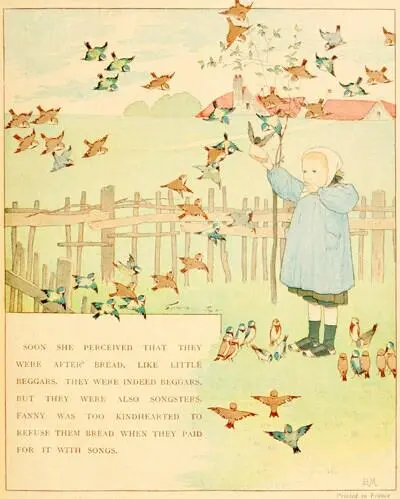
SOON SHE PERCEIVED THAT THEY WERE AFTER BREAD, LIKE LITTLE BEGGARS. THEY WERE INDEED BEGGARS, BUT THEY WERE ALSO SONGSTERS. FANNY WAS TOO KINDHEARTED TO REFUSE THEM BREAD WHEN THEY PAID FOR IT WITH SONGS.
Printed in FranceFanny saw that the birds were not all of the same nature. Some of them, ranged in a circle at her feet, waited till the crumbs fell near their little beaks. They were philosophers. There were others who circled neatly around her in the air, and one even who came and actually pecked at the slice of bread in her hand.
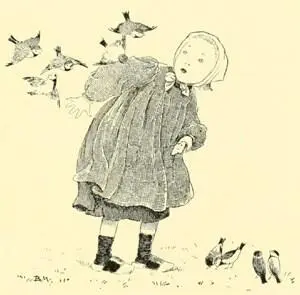
She crumbled the bread and threw the crumbs to them all. But they didn’t all eat it, because as Fanny could see, the boldest and cleverest left nothing for the others.
“It isn’t right,” she said to them; “each one must take his turn.”
They hardly heard her. One is not always heard when one speaks of justice. She tried in every way to favor the weaker ones, and encourage the timid, but she did not succeed with them. No matter how she tried she fed the fat at the expense of the thin. It made her very sorry: simple child that she was, she did not know it was the way of the world.
Crumb by crumb the slice of bread all went to the little singers, and Fanny went into her grandmother’s house again quite pleased.
At evening the grandmother took the basket in which Fanny had brought the cake to her, and filling it with plums and raisins put the handle over her arm, and said:
“Now, Fanny, run straight home, and don’t stop to amuse yourself and play with any of the village scamps. Be a good girl always. Good-bye.”
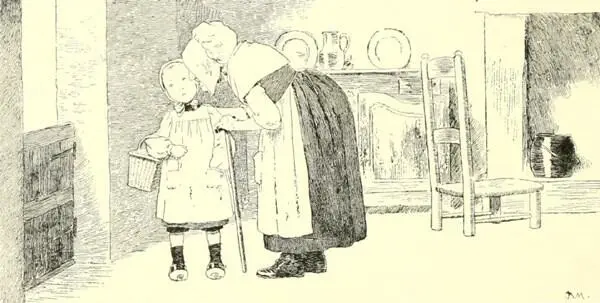
She kissed her, but Fanny stood a while very thoughtful at the threshold.
Читать дальшеИнтервал:
Закладка:
Похожие книги на «Our Children: Scenes from the Country and the Town»
Представляем Вашему вниманию похожие книги на «Our Children: Scenes from the Country and the Town» списком для выбора. Мы отобрали схожую по названию и смыслу литературу в надежде предоставить читателям больше вариантов отыскать новые, интересные, ещё непрочитанные произведения.
Обсуждение, отзывы о книге «Our Children: Scenes from the Country and the Town» и просто собственные мнения читателей. Оставьте ваши комментарии, напишите, что Вы думаете о произведении, его смысле или главных героях. Укажите что конкретно понравилось, а что нет, и почему Вы так считаете.
